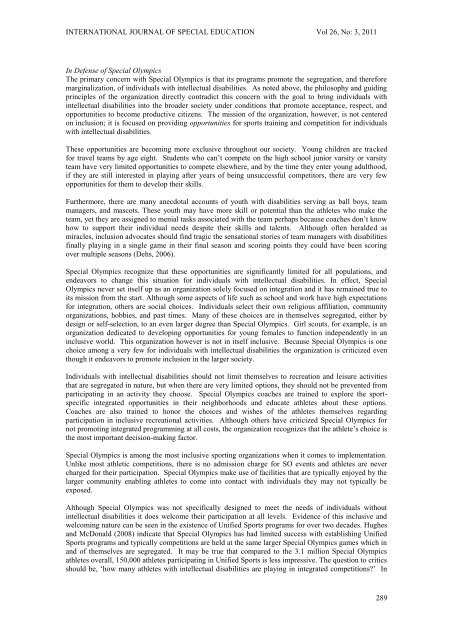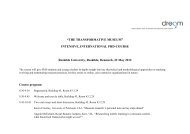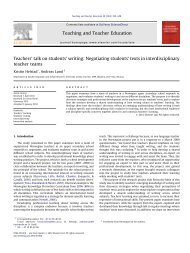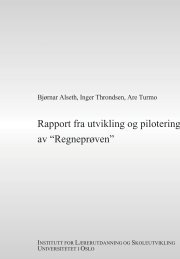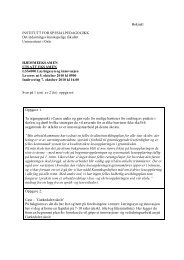International Journal Special Education
International Journal Special Education
International Journal Special Education
Create successful ePaper yourself
Turn your PDF publications into a flip-book with our unique Google optimized e-Paper software.
INTERNATIONAL JOURNAL OF SPECIAL EDUCATION Vol 26, No: 3, 2011In Defense of <strong>Special</strong> OlympicsThe primary concern with <strong>Special</strong> Olympics is that its programs promote the segregation, and thereforemarginalization, of individuals with intellectual disabilities. As noted above, the philosophy and guidingprinciples of the organization directly contradict this concern with the goal to bring individuals withintellectual disabilities into the broader society under conditions that promote acceptance, respect, andopportunities to become productive citizens. The mission of the organization, however, is not centeredon inclusion; it is focused on providing opportunities for sports training and competition for individualswith intellectual disabilities.These opportunities are becoming more exclusive throughout our society. Young children are trackedfor travel teams by age eight. Students who can’t compete on the high school junior varsity or varsityteam have very limited opportunities to compete elsewhere, and by the time they enter young adulthood,if they are still interested in playing after years of being unsuccessful competitors, there are very fewopportunities for them to develop their skills.Furthermore, there are many anecdotal accounts of youth with disabilities serving as ball boys, teammanagers, and mascots. These youth may have more skill or potential than the athletes who make theteam, yet they are assigned to menial tasks associated with the team perhaps because coaches don’t knowhow to support their individual needs despite their skills and talents. Although often heralded asmiracles, inclusion advocates should find tragic the sensational stories of team managers with disabilitiesfinally playing in a single game in their final season and scoring points they could have been scoringover multiple seasons (Dehs, 2006).<strong>Special</strong> Olympics recognize that these opportunities are significantly limited for all populations, andendeavors to change this situation for individuals with intellectual disabilities. In effect, <strong>Special</strong>Olympics never set itself up as an organization solely focused on integration and it has remained true toits mission from the start. Although some aspects of life such as school and work have high expectationsfor integration, others are social choices. Individuals select their own religious affiliation, communityorganizations, hobbies, and past times. Many of these choices are in themselves segregated, either bydesign or self-selection, to an even larger degree than <strong>Special</strong> Olympics. Girl scouts, for example, is anorganization dedicated to developing opportunities for young females to function independently in aninclusive world. This organization however is not in itself inclusive. Because <strong>Special</strong> Olympics is onechoice among a very few for individuals with intellectual disabilities the organization is criticized eventhough it endeavors to promote inclusion in the larger society.Individuals with intellectual disabilities should not limit themselves to recreation and leisure activitiesthat are segregated in nature, but when there are very limited options, they should not be prevented fromparticipating in an activity they choose. <strong>Special</strong> Olympics coaches are trained to explore the sportspecificintegrated opportunities in their neighborhoods and educate athletes about these options.Coaches are also trained to honor the choices and wishes of the athletes themselves regardingparticipation in inclusive recreational activities. Although others have criticized <strong>Special</strong> Olympics fornot promoting integrated programming at all costs, the organization recognizes that the athlete’s choice isthe most important decision-making factor.<strong>Special</strong> Olympics is among the most inclusive sporting organizations when it comes to implementation.Unlike most athletic competitions, there is no admission charge for SO events and athletes are nevercharged for their participation. <strong>Special</strong> Olympics make use of facilities that are typically enjoyed by thelarger community enabling athletes to come into contact with individuals they may not typically beexposed.Although <strong>Special</strong> Olympics was not specifically designed to meet the needs of individuals withoutintellectual disabilities it does welcome their participation at all levels. Evidence of this inclusive andwelcoming nature can be seen in the existence of Unified Sports programs for over two decades. Hughesand McDonald (2008) indicate that <strong>Special</strong> Olympics has had limited success with establishing UnifiedSports programs and typically competitions are held at the same larger <strong>Special</strong> Olympics games which inand of themselves are segregated. It may be true that compared to the 3.1 million <strong>Special</strong> Olympicsathletes overall, 150,000 athletes participating in Unified Sports is less impressive. The question to criticsshould be, ‘how many athletes with intellectual disabilities are playing in integrated competitions?’ In289


